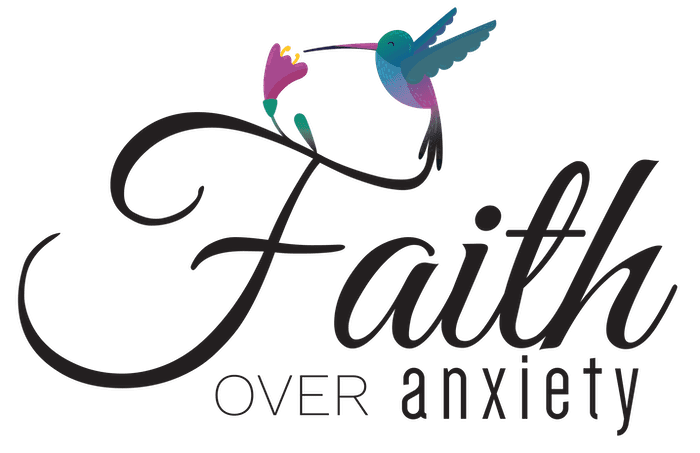To say that panic attacks are no fun is a huge understatement. Panic attacks can be absolutely terrifying.
I had my first major panic attack when I was 23, and it was indescribably scary. I was in my parent’s house alone, standing at the sink in my bathroom, when all of a sudden, the back of my neck started to feel hot. My mind started racing because I didn’t know what was going on.
Then in a snap, the hotness shot through my back and arms at lightning speed and down to my feet.
It literally felt like I was burning from the inside out, and I thought something supernatural was happening to me. I had no idea my body had the capacity to feel the way it did.

My heart started beating faster and louder than I’d ever felt it beat before, and in no way did I feel in control of it. It was the eeriest and most horrifying thing I’d ever felt.
I rushed out of the bathroom and into the living room. My eyes were bulging out of my head and bolting around the room because I thought I was having a heart attack and I could barely breathe.
The only thing I could think to do at that moment was to prepare myself for death.
I wasn’t really a Christian at that time, but I desperately searched for a Bible to read some Scripture because I was completely certain that I was going to die.
I turned to 1 Corinthians 13:1 and read out loud “Love is patient, Love is kind. It does not envy, it does not boast…”
As I read, I could feel my heart slowing down. So I kept reading. Eventually, the sensations of hotness went away, and my heart (which seemed to have a mind and will of its own) slowed to a normal beat.
I thought it was an incredible miracle from God!
Later that evening, I was hospitalized for a breakdown after my mind and body went haywire again. I thought something supernatural was happening to me and my body and mind spiraled out of control. I lost touch with reality.
Looking back, I can see how this was all part of the aftermath of severe trauma. A few days before my episode, my depression fell to a dark low. I hadn’t slept in 72 hours, and I hadn’t eaten much of anything in that time either.
I didn’t understand that what I had initially experienced was a severe panic attack. I had no context for assessing and categorizing the thoughts, sensations, and physiological changes I felt.
For the next few years, I frequently had panic attacks, even when I learned what they were. Most of the time, they’d come on strong out of absolutely nowhere. And each time, I thought I could potentially die.
One of my friends witnessed me having a panic attack one day and it completely terrified her.
I had a lingering worry and anticipation at all times that I would have more panic attacks, and I had them everywhere. – On the subway, walking down the sidewalk, in my apartment, at the movies, at church services, while driving, etc.

I had a panic attack so severe, I called the paramedics and waited terrified in a confused and concerned neighbor’s apartment.
At other times while I was out in the world, I rushed myself to the nearest ER.
The agoraphobia became so bad, I cornered myself in my apartment with the AC on freezing because I was afraid of feeling hot.
I couldn’t leave my space, even when I had scheduled appointments and other places to be. I didn’t have the strength or courage to face the outside world.
I temporarily lost the ability to function…
But now I comfortably live alone, away from my home state and close family and friends.
I still have panic attacks every once in a blue moon, but they never last more than 3 minutes.
They aren’t fun, and they cause a degree of duress and malfunction, but they don’t take up unnecessary space in my life anymore. I never worry that I’m going to die or develop another lingering panic disorder.
While I can’t sit with you and drill down the exact triggers of your panic or offer you top tier therapy, I can empathize and relate to you and let you know what I do to keep my panic attacks at bay.
*If you have a panic disorder or are concerned you may develop one, seek professional help as soon as possible. There’s nothing you can read on the internet, no matter how helpful it is, that will suffice in place of psychotherapy*
So with that said, here’s what I do to nip my panic attacks in the bud or significantly lessen their severity.
1) I proactively take care of my body by eating and sleeping well
When I had my first major panic attack, I hadn’t eaten real food or slept in 72 hours.
I was dealing with severe trauma and depression, and I didn’t understand the importance of eating balanced meals.
Skipping meals or consuming large amounts of fat and sugar puts your body in an unnecessary danger zone.
The food you eat not only helps control your mood, but it also helps to regulate your circadian rhythm. When you don’t sleep in a 24 hour period, you’re basically as mentally impaired as a drunk person, and your body becomes unstable and weak.
Panic attacks are not all in the mind. Panic attacks are a panic of the entire body, so it’s important to fortify your body with the right nutrients so that it’s natural defense system is strong.
If you’re having trouble getting your diet together, I strongly suggest signing up to receive my free Anxiety and Depression Nutrition Toolkit, which includes a grocery list, food/mood log, and 20 vitamins and supplements to consider for mental health.
2) When the panic comes, I don’t immediately try to stop it
I think it’s important to acknowledge and accept your negative emotions when they come up.
I also apply this to panic attacks.
I acknowledge my thoughts, even if they are irrational. When I feel my palms or underarms getting sweaty, my heart rate starting to climb, my breathing getting shallow, and my body getting hot, I sit with it and breathe as best as I can for a few moments.
I don’t run and grab essential oils, or rush to get a drink of water.
I don’t rush to do anything.
I close my eyes, feel the sensations, categorize them as sensations, and breathe deeply as best as I can. For detailed tips on deep breathing, check out my post on Why Deep Breathing is Crucial for Mental Health.
This helps me because if I’m out in the world and don’t have the ability to grab any external help aides, I’ve learned the invaluable skill of sitting with my panic.

Frantically trying to stop a panic attack only makes it more severe.
3) I challenge my irrational thoughts with facts and assurances
Self-talk has been very helpful for me in controlling my panic attacks, but I didn’t acquire those skills on my own.
Going to therapy, and getting handouts from professionals regarding panic attacks – what they are, what’s happening in the body, why they’re not dangerous- has helped me tremendously to be able to beat down the panic with facts.
The first thing I tell myself is: There’s no real threat of danger in this moment.
This is the truth. The physiological changes in your body are real. You are getting hot (or cold). You are trembling. Your hands or fingers are getting numb. You are sweating. Your heart is beating faster and louder, etc.
But this is your body’s natural fight or flight response to a perceived threat. The body is doing what it’s made to do to survive. You are not in danger. You are in survival mode.
The same sensations you feel on a rollercoaster is what you feel during a panic attack. One is just a little more fun of an experience than the other.
The second thing I tell myself is: You are in control. You have the power to stop this.
When you’re in the throes of a panic attack, there’s an element of powerlessness.
You feel like a robot gone haywire. It feels like something crazy is happening to you and you have no control… because that’s exactly what your body is signaling.
The intense fear comes from the absence of certainty and the belief that some impending doom is about to occur.
But I’ve given myself the certainty of control and power when I feel panic coming on. At first, it was very hard to convince myself of this, but eventually, I started really believing it. And that’s when things really started to permanently change for the better.
4) I notice calm cues from my body and then engage in an activity that requires my FULL attention
While I’m doing my deep breathing and self-talk, there’s always a point where I feel cues that I’m calming down.
My heart may beat slightly slower. Parts of my body might feel a little less hot. So I capitalize on that and I celebrate it as a success. The calm ball is officially rolling.
That’s when I start moving around again. That’s when I take a moment to drink a couple of glasses of water. I may try to eat something.
Then I focus my attention on another activity to further distance myself from the panic. It could be anything. I could call someone, read a book or article, do a load of laundry, paint my nails…
The point is to completely focus on continuing life as normal; pardoning the interruption of panic, and continuing with your regularly scheduled program.
If I’m away from home, trapped on the train or something, I still monitor calm cues in my body.
If someone is near me, I start a conversation about an innocuous topic.
But there have been instances where I’ve been on a train car completely alone in the middle of the night. I’d find something on the train and describe it as thoroughly as I could. And then I’d take out my phone and watch a funny YouTube cat video…
There was a time I couldn’t drive more than 30 minutes in any direction away from my parent’s house for fear of having a panic attack. I never thought I would be able to live on my own, fly in a plane again, or travel to see different parts of the world.
I thought my life was over.
But time, therapy, and practice have healed me. I’m completely free from the grips of panic, and I’m not going back into bondage any time soon!
And If I could do it, anybody can do it…
I hope this was helpful. Let me know your thoughts in the comments below!
Sincerely,
Alexia






0 Comments